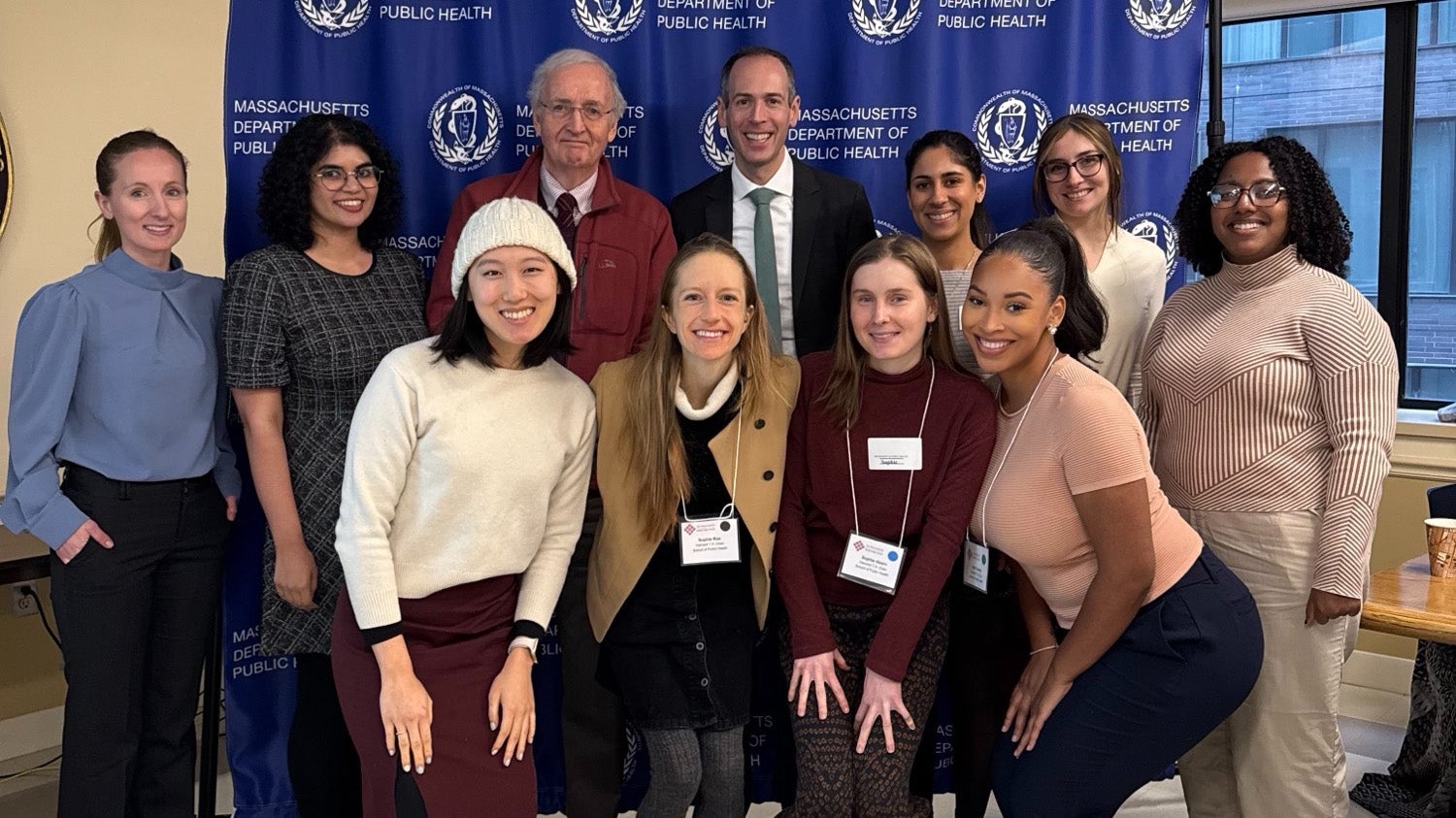Master of Public Health – Health Policy

Complete the form linked below to receive additional information about Harvard Chan School’s degree programs.
Summary
The Master of Public Health in Health Policy prepares students for high-impact careers in health care policy-making.
The degree provides students with a rigorous foundation in public health as well as specialized skills in decision sciences, health economics, health care financing, plus quality improvement and patient safety. The MPH in Health Policy is offered in two variants—45-credit and 65-credit—to fit the needs of students with different educational goals and experience. Questions about the program? Contact mph@hsph.harvard.edu.
About
The Master of Public Health 45-credit degree provides established professionals and medical students with specialized knowledge and skills to advance their career in public health.
The MPH in Health Policy prepares students to apply economic, legal, and political analysis to the design, implementation, and evaluation of health care and public health policies in the United States or other countries with high-income economies.
Through the study of biostatistics, epidemiology, and other quantitative disciplines, students also acquire skills in interpreting and evaluating scientific evidence to inform their policy work. Students are encouraged to choose elective courses that will help them develop greater expertise in a policy area of interest, such as access to care, health care quality, pharmaceutical policy, injury prevention, or health care financing.
Graduates work in policy positions in the public, nonprofit, and private sectors as policy analysts, advocates, and consultants.
On Campus (Fall start) • Full-time (1 year) • Part-time (2 years)
Curriculum
MPH core requirements:
- ID 100: Foundations for Public Health
- ID 201: Core Principles of Biostatistics and Epidemiology for Public Health Practice
- MPH 101: Qualitative Methods for Public Health
- MPH 102: Health Systems
- MPH 103: Leadership and Communication
- MPH 104: Social, Behavioral, and Structural Determinants of Health
Applied practice experience and integrative learning experience:
- HPM 945: Applied Practice Experience and Integrative Learning Experience for Health Policy
Field of study requirements:
- HPM 206: Economic Analysis
- HPM 210: United States Health Policy
- HPM 247: Political Analysis and Strategy for U.S. Health Policy
- Analytical methods course
- 2.5 credits of additional HPM health policy coursework beyond the field of study requirements
The courses below are popular elective options for Health Policy students. Explore the Harvard Course Catalog to view the breadth and depth of elective courses available at the Harvard Chan School, other Harvard Graduate Schools, and the Massachusetts Institute of Technology.
- HPM 509: Disability Policy in the U.S.
- HPM 561: Loneliness and Public Health
- HPM 562: Narrative Leadership – Using Storytelling to Mobilize Collective Action in Public Health
Competencies
- Apply economic concepts to analyze and critique health care and public health policies
- Recommend a course of action to address a health policy challenge that includes assessing alternative approaches within a specific political, economic, and/or social context
- Critically evaluate and draw policy implications from health decision science studies (including cost-effectiveness) or health policy program evaluations
- Design an effective political strategy to influence a health policy outcome
- Prepare professional quality health policy memos that are informed by skillful use of evidence and are appropriate to their purpose and audience
Our Community
Committed, Accomplished, Collaborative
As a Harvard Chan MPH student, you will work in a collaborative classroom environment alongside talented students from around the world and from a variety of academic and professional backgrounds. You will take advantage of the extraordinary resources of Harvard University and Boston’s Longwood Medical Area—home to Harvard Medical School, Brigham and Women’s Hospital, Boston Children’s Hospital, the Dana-Farber Cancer Institute, and other world-class health facilities. You will meet global leaders and work with world-renowned faculty members. And when you graduate, you will benefit from Harvard’s unparalleled global network of alumni leaders.
I don’t think anything makes me lean at the edge of my seat more than talking about the opportunities that exist to make the country a more equitable place.
Yvette Cho, MPH ’24

Career Outcomes
An MPH degree opens an extraordinary number of pathways to a meaningful career. Graduates of the MPH program are trained to pursue careers in a variety of industries:
- Academic medicine
- Biotech/pharma
- Consulting
- Government
- Health care management
- Hospital/health care delivery
- Non-profit/Non-government organizations
- Private practice
- Private sector institutions
- Public health agencies
- University/research
Eligibility Criteria
Applicants for the MPH 45-credit degree program in Health Policy must have one of the following:
- A bachelor’s degree, plus five or more years of relevant health experience.
- A master’s degree in a health-related field—for example, MSN, MSW, MBA—plus at least two years of relevant health experience.
- A prior doctoral degree—for example, MD, DO, DMD, DDS, PhD, SD, JD—or equivalent.
- Completed the primary clinical year of medical or dental school or be a 1L student at Harvard Law School. For more information, visit Joint/Combined Degrees.
Application Requirements
All applications must be submitted through SOPHAS – the centralized application service for public health programs. In addition to the application, applicants must submit:
- Statement of purpose and objectives
- Standardized test scores (optional)
- Three letters of reference
- Resumé/curriculum vitae
- Post-secondary transcripts or mark sheets (World Education Services credential evaluation for applicants with degrees from outside of the United States)
- English language proficiency (TOEFL/IELTS/Duolingo English Test), if applicable
Application Deadline: December 1
Applicants may apply to only one degree program for either full- or part-time status. Applications are reviewed in their entirety and decisions are released via email in late February/early March. Decisions are not released until all application components are received.
About
The Master of Public Health 65-credit degree provides early career professionals with the breadth of knowledge and subject-specific expertise needed to forge a successful career in public health.
The MPH in Health Policy prepares students to apply economic, legal, and political analysis to the design, implementation, and evaluation of health care and public health policies in the United States or other countries with high-income economies.
Through the study of biostatistics, epidemiology, and other quantitative disciplines, students also acquire skills in interpreting and evaluating scientific evidence to inform their policy work. Students are encouraged to choose elective courses that will help them develop greater expertise in a policy area of interest, such as access to care, health care quality, pharmaceutical policy, injury prevention, or health care financing.
Graduates work in policy positions in the public, nonprofit, and private sectors as policy analysts, advocates, and consultants.
On Campus (Fall start) • Full-time (1.5 years) • Part-time (2+ years)
Curriculum
MPH core requirements:
- ID 100: Foundations for Public Health
- ID 201: Core Principles of Biostatistics and Epidemiology for Public Health Practice
- MPH 101: Qualitative Methods for Public Health
- MPH 102: Health Systems
- MPH 103: Leadership and Communication
- MPH 104: Social, Behavioral, and Structural Determinants of Health
Applied practice experience and integrative learning experience:
- HPM 965: Applied Practice Experience and Integrative Learning Experience for Health Policy
Field of study requirements:
- HPM 206: Economic Analysis
- HPM 210: United States Health Policy
- HPM 247: Political Analysis and Strategy for U.S. Health Policy
- Analytical methods course
- Leadership course
- 2.5 credits of additional HPM health policy coursework beyond the field of study requirements
- 5 credits of depth in a specific health policy area of interest
The courses below are popular elective options for Health Policy students. Explore the Harvard Course Catalog to view the breadth and depth of elective courses available at the Harvard Chan School, other Harvard Graduate Schools, and the Massachusetts Institute of Technology.
- HPM 509: Disability Policy in the U.S.
- HPM 561: Loneliness and Public Health
- HPM 562: Narrative Leadership – Using Storytelling to Mobilize Collective Action in Public Health
Competencies
- Apply economic concepts to analyze and critique health care and public health policies
- Recommend a course of action to address a health policy challenge that includes assessing alternative approaches within a specific political, economic, and/or social context
- Critically evaluate and draw policy implications from health decision science studies (including cost-effectiveness) or health policy program evaluations
- Design an effective political strategy to influence a health policy outcome
- Prepare professional quality health policy memos that are informed by skillful use of evidence and are appropriate to their purpose and audience
Our Community
Committed, Accomplished, Collaborative
As a Harvard Chan MPH student, you will work in a collaborative classroom environment alongside talented students from around the world and from a variety of academic and professional backgrounds. You will take advantage of the extraordinary resources of Harvard University and Boston’s Longwood Medical Area—home to Harvard Medical School, Brigham and Women’s Hospital, Boston Children’s Hospital, the Dana-Farber Cancer Institute, and other world-class health facilities. You will meet global leaders and work with world-renowned faculty members. And when you graduate, you will benefit from Harvard’s unparalleled global network of alumni leaders.
Latest News
-

Caring for the caregivers
Health Policy May 15, 2025 -

Nurturing student entrepreneurs
September 12, 2024
Career Outcomes
An MPH degree opens an extraordinary number of pathways to a meaningful career. Graduates of the MPH program are trained to pursue careers in a variety of industries:
- Academic medicine
- Biotech/pharma
- Consulting
- Government
- Health care management
- Hospital/health care delivery
- Non-profit/Non-government organizations
- Other/for-profit
- Private practice
- Private sector institutions
- Public health agencies
- University/research
For students in the MPH 65-credit program, the summer practicum experience often opens up career opportunities with a range of organizations.
Eligibility Criteria
Applicants for the MPH 65-credit degree program must have the following:
- A bachelor’s degree, plus two or more years of contiguous full-time work experience in an area relevant to public health.
Application Requirements
All applications must be submitted through SOPHAS – the centralized application service for public health programs. In addition to the application, applicants must submit:
- Statement of purpose and objectives
- Standardized test scores (optional)
- Three letters of reference
- Resumé/curriculum vitae
- Post-secondary transcripts or mark sheets (World Education Services credential evaluation for applicants with degrees from outside of the United States)
- English language proficiency (TOEFL/IELTS/Duolingo English Test), if applicable
Application Deadline: December 1
Applicants may apply to only one degree program for either full- or part-time status. Applications are reviewed in their entirety and decisions are released via email in late February/early March. Decisions are not released until all application components are received.
Unleash your potential at Harvard Chan School.
In addition to our degree programs, we offer highly targeted executive and continuing education, directed and taught by Harvard faculty.


